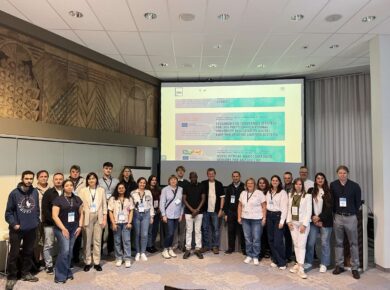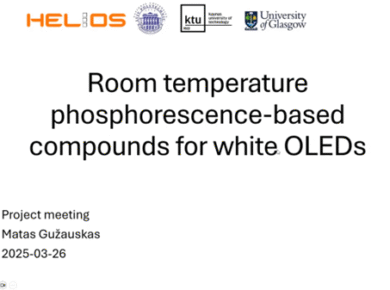// HELIOS Project
Light of
the Future
Innovative LEDs for sustainable and efficient lighting
Learn More// HELIOS Project
Advanced Lighting Technologies
Implementing innovative solutions to ensure high-quality lighting
Learn More Science
Changing Lighting
Innovative LEDs for sustainable and efficient lighting. Development of new molecules to improve LED and OLED characteristics
Learn More
// HELIOS PROJECT
Pioneering Innovation in White-Emitting Organic Lighting
HELIOS is dedicated to advancing cutting-edge research in ultra-efficient white-emitting organic lighting systems. Through interdisciplinary collaboration, knowledge transfer, and breakthrough technologies, we strive to revolutionize sustainable lighting solutions for the future.
European-Funded Excellence
Strengthening research capacity through Horizon Europe support
Innovative Research
Developing next-generation white light emitters for WOLEDs and WLEDs.
Global Collaboration
Uniting leading institutions from Ukraine, the EU, and the UK.
// HELIOS Project Overview
Organic Lighting:
Science and Market
Applications
Efficiently bridge cutting-edge organic material science with advanced lighting technology for a sustainable future. Empower researchers with unique methodologies that shape the future of white light-emitting organic devices (WOLEDs), integrating theoretical advancements with real-world applications. Seamlessly integrate innovation into market-ready solutions, ensuring an eco-conscious approach to next-generation lighting systems.
Dedicated Research Support
Collaborate across institutions to dynamically enhance research outcomes through user-centered innovations.
High-Quality Development
Advance the development of efficient materials and devices for optimal performance in modern lighting technologies.
Data-Driven Innovation
Monotonectally seize open an ROI before unique human is Efficiently fashion.
Researchers Involved
International Partners
Project Duration
// HELIOS Project PArtners
Coordinated by LPNU
with EU Partners and Associated partners

Lviv Polytechnic National University (LPNU)
Founded in 1816, LPNU is Ukraine’s oldest technical university and a leader in science and innovation. With 17 institutes, 100+ departments, 320 Doctors of Science, and vast international project experience (e.g., Horizon Europe, Erasmus+), LPNU excels in research and education.
The Electronic Engineering Department specializes in thin-film structures, nanocomposites, and organic light-emitting devices, supported by advanced facilities like vacuum deposition units and fiber-optic spectrometers.

Riga Technical University (RTU)
Established in 1862, RTU is the oldest technical university in the Baltic States, recognized for its engineering and technical education excellence. The Faculty of Materials Science and Applied Chemistry (FMSAC) leads cutting-edge research in materials science, polymer science, and nanotechnology, focusing on industrial and technological applications.
With state-of-the-art laboratories and global collaborations, FMSAC advances innovation in areas like energy sustainability and advanced material development.

Kaunas University of Technology (KTU)
KTU is a leading technical university in the Baltic States with strong industry ties and expertise in collaborative research. The Department of Polymer Chemistry and Technology hosts the renowned “Chemistry of Materials” research group, known for its work with industrial giants like Samsung, BASF, and Novaled.
Specializing in the design, synthesis, and application of organic semiconductors, the group advances innovations in OLEDs and electronic devices, making KTU a vital partner in cutting-edge research projects.

INTELLIGENTSIA CONSULTANTS SARL (INT)
INT provides expert training in project management, proposal writing, scientific communication, and intellectual property (IP). It has successfully supported over 50 EU-funded projects, including several “exceptional” Twinning initiatives like ASCIMAT and MaNaCa.
As members of ASTP, EARMA, and IOP, INT specializes in developing centers of excellence and fostering technology transfer, particularly in physics, nanomaterials, sensors, and aerospace. The company has a strong track record of collaboration with Ukrainian research institutes and integration into the European Research Area.

University of Glasgow (UoG)
Founded in 1451, UoG is the fourth-oldest university in the UK and is ranked among the top 100 universities globally (QS: 81st, THE: 86th). The School of Chemistry boasts 6 Nobel Prize laureates, including David MacMillan, a recent recipient.
Prof. Peter Skabara, Ramsay Chair of Chemistry, leads research in organic electronic and photonic materials and is renowned for synthesizing advanced organic semiconductors, enabling innovations in lasers, solar cells, transistors, LEDs, and molecular devices.
// HELIOS PROJECT
Bridging Science, Innovation,
and Market Applications
Are you interested in our Project?
Are you passionate about cutting-edge organic materials and next-generation lighting technologies? Get involved with the HELIOS project and be part of the innovation shaping white light-emitting organic devices (WOLEDs)
// HELIOS PROJECT AIM
What are the HELIOS project
main AIM and GOAL?
The HELIOS project aims to develop innovative, high-performance white-emitting organic materials designed to revolutionize the lighting industry. By harnessing the power of organic semiconductors, this project seeks to create more energy-efficient and sustainable lighting solutions. The research focuses on advancing the development of organic light-emitting diodes (OLEDs), which have the potential to reduce energy consumption and lower carbon footprints in various lighting applications.
Collaborating with leading academic and research institutions across Europe, the project brings together expertise from Lviv Polytechnic National University (LPNU), Kaunas University of Technology (KTU), Riga Technical University (RTU), and the University of Glasgow (UoG). Through this international partnership, HELIOS aims to push the boundaries of organic electronics, focusing on the design, synthesis, and application of cutting-edge organic semiconductors
With a focus on both scientific and technological innovation, the project strives to make a lasting impact on the global lighting industry, contributing to energy sustainability and fostering the transition to greener technologies. Over the course of its duration, HELIOS will not only deliver new scientific insights but also develop prototypes and practical solutions that can be applied in real-world lighting systems.

Subscribe our newsletter
Please Subscribe our news letter and and get update.












